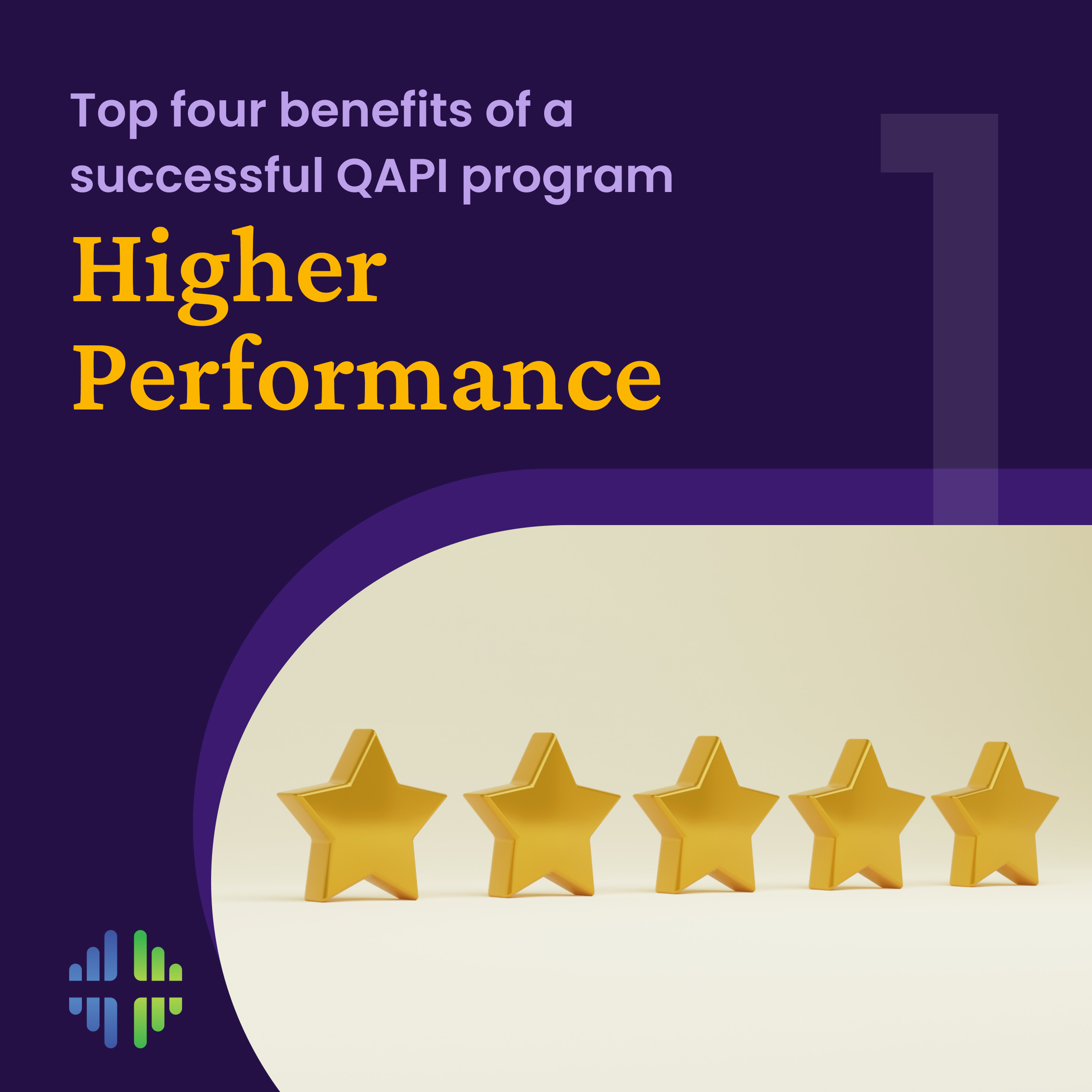1 min read
How to Survive the CMS Hospice Special Focus Program in 2024
In 2024 CMS increased direct oversight of hospice organizations. CMS has created a series of methodologies to identify hospices as poor performers,...
8 min read
QAPIplus : Oct 3, 2025 7:52:00 AM

AI is rapidly transforming quality management in post-acute care. It enhances patient outcomes by improving diagnostic accuracy and personalizing treatments. Operational efficiency also benefits through automated administrative tasks and resource optimization. This article explores how AI is changing quality management in post-acute care, providing detailed insights into its applications and future implications.
AI built for post-acute care is helping agencies improve patient outcomes and operational efficiency at the same time.
Automation of documentation, audits, and PIPs reduces administrative burden and frees staff to focus on direct care.
Real-time dashboards and predictive analytics make it easier to identify risks, act early, and drive measurable improvement.
Artificial intelligence (AI) refers to machines or software that mimic human cognitive functions, enabling sophisticated data analysis and supporting clinical decisions. In the realm of post-acute care, AI is more than just a tool; it is a catalyst for change. AI empowers clinical decision-making, enhancing diagnostic accuracy, personalizing treatment, and optimizing operational efficiency. This dual focus on patient care and operational workflows sets the stage for a healthcare revolution.
AI’s impact is evident in the integration of telehealth solutions and the enhanced analysis of patient data. These AI tools do not just simplify operations but also contribute significantly to overall quality management, ensuring that patient care is both efficient and effective. However, the most effective AI solutions do more than analyze. They integrate into daily workflows to support clinical teams in real time. AI surfaces risks early, suggests compliant actions, and helps maintain consistent documentation across teams and branches.
One of the most profound ways AI influences post-acute care is through its patient-centered approach. By focusing on individual patient needs and outcomes, AI promotes a more personalized and effective care strategy. Imagine a system that can identify subtle patterns for early diagnosis and facilitate personalized treatments. This capability dramatically improves recovery times and reduces mortality rates, making AI an indispensable asset in healthcare.
Operational efficiency is another critical area where AI makes a significant impact. AI contributes by:
Optimizing resource allocation, enabling healthcare professionals to offer better care without the strain of logistical challenges.
Automating routine administrative tasks, which reduces costs and improves logistics.
Making healthcare organizations more agile and responsive.
Analyzing large datasets quickly, empowering clinical teams to make informed decisions faster and enhancing overall operational efficiency.
Embracing AI in healthcare requires recognizing its broader implications. AI’s role in improving patient outcomes cannot be overstated. AI’s ability to identify subtle patterns for early diagnosis and facilitate personalized treatments significantly reduces recovery times and mortality rates. This focus on improving patient outcomes is at the core of AI’s integration into post-acute care.
The operational benefits of AI are equally transformative. By optimizing resource allocation and automating routine tasks, AI enhances operational efficiency, allowing healthcare professionals to focus more on direct patient care. This dual impact on patient care and operational workflows underscores the comprehensive benefits of integrating AI into post-acute care settings.
In summary, integrating AI into post-acute care quality management represents a paradigm shift, not just a technological advancement. AI sets new standards in healthcare by enhancing diagnostic accuracy, personalizing treatment, and optimizing operational efficiency. As we continue to embrace these technologies, the future of post-acute care looks brighter, more efficient, and profoundly patient-centered. QAPIplus is one such solution, built by clinicians who understand the daily pressures of post-acute compliance. It empowers agencies to improve care, reduce risk, and stay ready for surveys at all times.
AI-powered monitoring tools identify subtle health changes early and alert care teams before conditions worsen. This is especially useful for detecting falls, infection risks, or signs of delirium. Privacy-safe devices and wearables collect real-time data, giving staff the insight they need to intervene quickly and protect patients.
By tracking environmental risks like noise or light exposure, AI also helps create a safer space for recovery. The ability to monitor conditions and predict deterioration supports faster, more effective interventions.
AI tools enhance patient safety and improve staff confidence. When AI handles early detection and documentation, clinical teams can focus more on patients and less on paperwork.
Clinical documentation is a cornerstone of effective patient care, yet it often poses a significant administrative burden. Enter AI and natural language processing, which are revolutionizing this critical aspect of healthcare. Most studies utilizing natural language processing in clinical documentation primarily focus on home health care settings, highlighting its emerging application in post-acute care. This technology is becoming increasingly relevant, particularly for automating clinical documentation purposes.
AI and natural language processing are making clinical documentation faster and more accurate. Instead of spending hours filling out forms or cleaning up reports, staff can rely on AI to extract relevant details, auto-fill key fields, and ensure timely updates.
QAPIplus leverages this technology to reduce administrative work while maintaining survey-ready documentation. This helps home health providers spend less time on data entry and more time delivering care.
Artificial intelligence in post-acute care isn’t just about data, it’s about decisive action. That’s where QAPIplus stands apart. The platform includes a growing suite of embedded AI agents designed to help agencies not only identify risks but respond to them instantly, effectively, and in alignment with accreditor expectations.
Two agents are already transforming how teams manage compliance and quality improvement: QAiPI-PIP and QAiPI-CONSULTANT.
Performance Improvement Projects (PIPs) are a foundational requirement under QAPI, but most teams dread creating them. QAiPI-PIP takes that burden off your plate. This agent auto-generates targeted, survey-aligned PIPs based on real-time trends in your audits, incidents, or clinical data. It’s more than a template, it’s a smart, pre-filled plan tailored to your actual data.
No more starting from scratch. Plans are automatically populated with appropriate goals, interventions, and tracking elements.
Surveyor-ready by design. Each PIP is aligned to CHAP and ACHC expectations for defensibility and documentation.
Track progress in-platform. Assign owners, flag overdue steps, and demonstrate progress without juggling spreadsheets or binders.
With QAiPI-PIP, quality improvement becomes proactive and continuous, not reactive and rushed.
Every day brings new compliance questions, especially in home health and hospice, where regulations are layered, evolving, and high-stakes. QAiPI-CONSULTANT is a real-time AI assistant trained specifically on post-acute care standards. Whether you're clarifying a policy requirement, preparing for an emergency drill, or verifying documentation standards, this agent gives you instant, surveyor-grade guidance.
Trusted intelligence, 24/7. No waiting for a callback or digging through PDFs, just ask and get an answer.
Trained on real post-acute scenarios. QAiPI-CONSULTANT is built from the ground up for QAPI, Emergency Management, Infection Control, and more.
A cost-saving alternative to consultants. Agencies get expert-grade guidance without the recurring cost or delay of external advisors.
This is compliance confidence on demand and it’s changing how quality teams operate day to day.
These AI agents aren't just features. They’re force multipliers for your staff, helping teams move faster, make smarter decisions, and stay focused on what matters most: delivering safe, high-quality care.
One of the most time-consuming and stress-inducing parts of quality management in post-acute care is the chart audit. Reviewing records manually to ensure timeliness, completeness, and compliance with accreditor standards can take hours each week and even then, critical issues may be missed until it’s too late.
AI-powered chart auditing changes that. By connecting to an EMR or running independently, AI can review hundreds of records quickly, flagging missing signatures, untimely documentation, or incomplete visits before a surveyor ever sees them. This proactive approach saves staff time, reduces errors, and ensures defensible documentation.
Automating chart audits isn’t just about efficiency. It’s about transforming audits from a reactive scramble into a continuous, risk-reducing process. Agencies can address gaps early, support coaching with surveyor-style rationale for each finding, and walk into surveys with confidence knowing their documentation has already been reviewed with the same scrutiny.
The era of one-size-fits-all treatment plans is fading, thanks to the advent of AI in healthcare. AI enables personalized patient care by:
Examining data and patient histories
Creating tailored care plans and interventions
Improving overall care quality
Significantly enhancing health outcomes
Integrating diverse data types, including genomic and behavioral information
Allowing for tailored interventions that meet individual patient needs
This patient-centered approach transforms healthcare delivery.
The convergence of AI and precision medicine enables healthcare providers to tailor interventions based on individual patient profiles and health determinants. This approach ensures that treatment strategies are not just effective but also personalized, addressing the unique needs of each patient. Rapid data analysis by AI technologies enables timely adjustments in patient care based on real-time health metrics.
AI-assisted platforms play a crucial role in improving patient knowledge and understanding of their medications, leading to better adherence and health outcomes. Automated SMS reminders designed with AI have been shown to increase medication refill rates among older patients with chronic diseases. This capability ensures that patients remain engaged and proactive in their care journey.
Successful implementation of personalized care via AI depends on continuous learning from patient data to enhance treatment efficacy. By leveraging AI tools, healthcare providers can facilitate better communication with patients, addressing adherence issues and ensuring that care plans are both effective and personalized.
Medication management is a critical aspect of patient care that significantly impacts patient outcomes and safety. AI’s ability to customize pharmaceutical treatments based on an individual’s medical history and genetic profile enhances both safety and effectiveness. Imagine a system where each patient’s medication regimen is tailored precisely to their unique health needs, minimizing adverse effects and maximizing therapeutic benefits. This personalized approach not only improves patient outcomes but also fosters better patient satisfaction.
AI also assists caregivers with medication administration by providing instant, tailored answers through AI chatbots. These AI tools offer real-time guidance on medication dosages, potential interactions, and administration schedules, ensuring that caregivers can provide accurate and timely care. This capability is particularly beneficial in post-acute care settings, where patients often have complex medication regimens.
The impact of AI on patient satisfaction and medication management is profound. AI ensures patients receive the right medications at the right times, enhancing adherence and overall health outcomes. This transformation is not just about improving medication management; it’s about improving patient care and ensuring that patients have a positive and safe care experience.
AI’s role in addressing mental health and disease progression is significant. It helps by:
Analyzing patient data
Predicting potential health issues
Assisting healthcare providers to intervene early
Allowing adjustment of treatment plans accordingly using an ai model.
This proactive approach ensures that patients receive timely and effective care, reducing the risk of complications and risk stratification to improve patient outcomes.
In the demanding environment of post-acute care, staff efficiency is paramount. AI supports healthcare practitioners by automating routine tasks, allowing them to devote more time to direct patient care. Imagine a healthcare system where administrative burdens are significantly reduced, enabling caregivers to focus on what truly matters: patient care. AI tools can significantly reduce these burdens, freeing up valuable time for healthcare staff to engage more meaningfully with patients and assist therapists.
Automated systems can analyze patient data efficiently, simplifying quality and compliance processes like audits and survey-prep. AI’s ability to continuously monitor workflows and suggest real-time adjustments further enhances operational efficiency. This dynamic approach ensures that healthcare organizations can adapt quickly to changing needs and demands.
AI also plays a crucial role in ensuring that patients receive adequate attention despite low staffing levels. Administrative overload is a major driver of staff burnout. AI alleviates this by automating repetitive tasks like data aggregation, reporting, and credential tracking.
The reduction in time spent on routine tasks allows healthcare professionals to focus more on patient care, enhancing both patient outcomes and staff satisfaction. This shift not only improves the quality of care but also fosters a more positive and supportive work environment for healthcare staff. AI’s role in operational efficiency and human analysis underscores its potential to transform post-acute care.
In conclusion, AI-driven solutions are enhancing staff efficiency by automating routine tasks, simplifying processes, and providing real-time insights. As healthcare organizations continue to integrate these technologies, the future of staff efficiency in post-acute care looks promising, efficient, and profoundly patient-centered.
For AI to be effective, it must fit into how post-acute teams actually work. QAPIplus was built with that in mind. It integrates with top EMRs, reflects accreditor expectations, and offers a simple user experience.
True adoption requires more than technology. It depends on leadership commitment, staff engagement, and continuous monitoring. Agencies should validate AI for safety, accuracy, and financial impact before scaling. They should pilot new tools in smaller settings to gather feedback and refine workflows, then expand once benefits are proven.
Other critical factors include protecting data privacy, designing tools that reflect local workflows, and ensuring ongoing updates so the system keeps pace with changing regulations. When leaders bring staff into the process, align technology with clinical needs, and treat AI as a living part of operations rather than a side project, the return is significant.
Agencies that take this approach reduce compliance risk, improve staff confidence, and elevate patient safety. By embedding AI into daily operations, organizations set themselves up for consistent, measurable performance gains.
AI will continue to evolve, but its role in post-acute care is already clear. Agencies that adopt AI today are setting themselves up for safer care, stronger compliance, and better outcomes.
At QAPIplus, we believe that quality should be built in, not bolted on. Our AI-enhanced platform reflects that belief. By embedding intelligence into daily workflows, we help agencies move from reactive to ready, every day, every patient, every chart.

1 min read
In 2024 CMS increased direct oversight of hospice organizations. CMS has created a series of methodologies to identify hospices as poor performers,...

1 min read
Based on the latest CMS communications and the Final Rules, home health and hospice organizations can expect even greater oversight by CMS and its...

1 min read
To achieve QAPI success, it is crucial to expand QAPI beyond your quality team and engage your entire organization. By doing so, QAPI becomes less of...